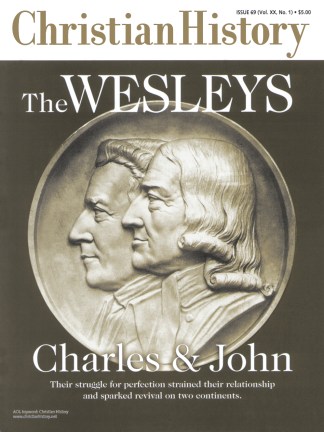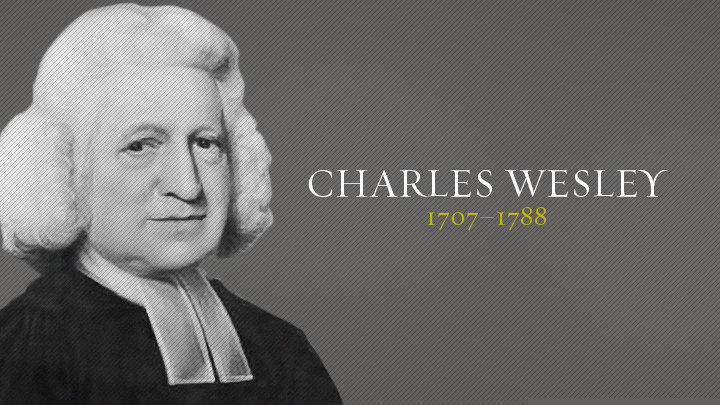"O for a thousand tongues to sing / My dear Redeemer's praise / The glories of my God and King, / The triumphs of his grace!"
He was said to have averaged 10 poetic lines a day for 50 years. He wrote 8,989 hymns, 10 times the volume composed by the only other candidate (Isaac Watts) who could conceivably claim to be the world's greatest hymn writer. He composed some of the most memorable and lasting hymns of the church: "Hark! The Herald Angels Sing," "And Can It Be," "O for a Thousand Tongues to Sing," "Love Divine, All Loves Excelling," "Jesus, Lover of My Soul," "Christ the Lord Is Risen Today," "Soldiers of Christ, Arise," and "Rejoice! the Lord Is King!"
And yet he is often referred to as the "forgotten Wesley."
His brother John is considered the organizational genius behind the founding of Methodism. But without the hymns of Charles, the Methodist movement may have gone nowhere. As one historian put it, "The early Methodists were taught and led as much through [Charles's] hymns as through sermons and [John] Wesley's pamphlets."
Language scholar
Charles Wesley was the eighteenth of Samuel and Susannah Wesley's nineteen children (only 10 lived to maturity). He was born prematurely in December 1707 and appeared dead. He lay silent, wrapped in wool, for weeks.
When older, Charles joined his siblings as each day his mother, Susannah, who knew Greek, Latin, and French, methodically taught them for six hours. Charles then spent 13 years at Westminster School, where the only language allowed in public was Latin. He added nine years at Oxford, where he received his master's degree. It was said that he could reel off the Latin poet Virgil by the half hour.
Timeline |
|
|
1675 |
Spener's Pia Desideria advances Pietism |
|
1678 |
John Bunyan writes The Pilgrim's Progress |
|
1689 |
Toleration Act in England |
|
1707 |
Charles Wesley born |
|
1788 |
Charles Wesley dies |
|
1789 |
French Revolution begins |
It was off to Oxford University next, and to counteract the spiritual tepidity of the school, Charles formed the Holy Club, and with two or three others celebrated Communion weekly and observed a strict regimen of spiritual study. Because of the group's religious regimen, which later included early rising, Bible study, and prison ministry, members were called "methodists."
In 1735 Charles joined his brother John (they were now both ordained), to become a missionary in the colony of Georgia—John as chaplain of the rough outpost and Charles as secretary to Governor Oglethorpe.
Shot at, slandered, suffering sickness, shunned even by Oglethorpe, Charles could have echoed brother John's sentiments as they dejectedly returned to England the following year: "I went to America to convert the Indians, but, oh, who will convert me?"
It turned out to be the Moravians. After returning to England, Charles taught English to Moravian Peter Böhler, who prompted Charles to look at the state of his soul more deeply. During May 1738, Charles began reading Martin Luther's volume on Galatians while ill. He wrote in his diary, "I labored, waited, and prayed to feel 'who loved me, and gave himself for me.'" He shortly found himself convinced, and journaled, "I now found myself at peace with God, and rejoice in hope of loving Christ." Two days later he began writing a hymn celebrating his conversion.
Evangelistic preacher
At evangelist George Whitefield's instigation, John and Charles eventually submitted to "be more vile" and do the unthinkable: preach outside of church buildings. In his journal entries from 1739 to 1743, Charles computed the number of those to whom he had preached. Of only those crowds for whom he stated a figure, the total during these five years comes to 149,400.
From June 24 through July 8, 1738, Charles reported preaching twice to crowds of ten thousand at Moorfields, once called "that Coney Island of the eighteenth century." He preached to 20,000 at Kennington Common plus gave a sermon on justification before the University of Oxford.
On a trip to Wales in 1747, the adventurous evangelist, now 40 years old, met 20-year-old Sally Gwynne, whom he soon married. By all accounts, their marriage was a happy one.
Charles continued to travel and preach, sometimes creating tension with John, who complained that "I do not even know when and where you intend to go." His last nationwide trip was in 1756. After that, his health led him gradually to withdraw from itinerant ministry. He spent the remainder of his life in Bristol and London, preaching at Methodist chapels.
Magnificent obsession
Throughout his adult life, Charles wrote verse, predominantly hymns for use in Methodist meetings. He produced 56 volumes of hymns in 53 years, producing in his lyrics what brother John called a "distinct and full account of scriptural Christianity."
The Methodists became known (and sometimes mocked) for their exuberant singing of Charles's hymns. A contemporary observer recorded, "The song of the Methodists is the most beautiful I ever heard … They sing in a proper way, with devotion, serene mind and charm."
Charles Wesley quickly earned admiration for his ability to capture universal Christian experience in memorable verse. In the following century, Henry Ward Beecher declared, "I would rather have written that hymn of Wesley's, 'Jesus, Lover of My Soul,' than to have the fame of all the kings that ever sat on the earth." The compiler of the massive Dictionary of Hymnology, John Julian, concluded that "perhaps, taking quantity and quality into consideration, [Charles Wesley was] the greatest hymn-writer of all ages."
Corresponding Issue











